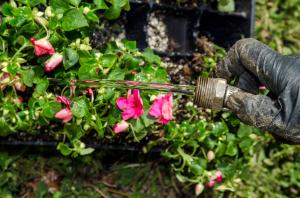Is it good to plant grass seed in the rain?
Planting grass seed in the rain is a common question among homeowners who want to have a beautiful and healthy lawn. While it may seem like a good idea to take advantage of the moisture in the air, there are certain considerations that need to be made before deciding whether to plant grass seed in the rain or not.
The advantages of planting grass seed in the rain
One of the major advantages of planting grass seed in the rain is that the moisture helps the seed to germinate and start growing. The rainwater provides the seed with much-needed hydration and the cool temperatures make it easier for the seed to establish itself. Additionally, planting in the rain can save time as you don't have to water the seed afterwards, which can be particularly helpful if you have a large lawn.
The disadvantages of planting grass seed in the rain
While there are some advantages to planting grass seed in the rain, there are also some disadvantages. One of the most significant concerns is that heavy rain can wash away the seeds, particularly if the soil is lacking in organic matter or there is a slope to the lawn. Additionally, planting grass seed in the rain can lead to the formation of soil crusts, which can make it difficult for the seed to germinate.
How to plant grass seed in the rain
If you decide to plant grass seed in the rain, there are a few steps you can take to help promote good growth. Firstly, it's important to prepare the soil properly before planting, making sure it's free of stones, debris and compacted earth. Secondly, use a slow-release fertilizer to provide the seed with the nutrients it needs to grow. Finally, be sure to select a grass seed mix that is suitable for your climate and soil type, as well as one that provides good coverage and strength.
Taking care of your new lawn
Once you've successfully planted your grass seed, it's time to start taking care of your new lawn. Watering is essential for the first few weeks after planting, especially if you planted in the rain as the rainwater may not be enough to keep the seed hydrated. Be sure to water deeply and consistently and avoid watering too much, which can lead to the development of fungal diseases. Mowing should also be started once the grass has reached a height of about 3 inches, and be sure to use a sharp mower blade to avoid damaging the young grass blades.
In conclusion
Planting grass seed in the rain can be a good idea if done properly, but it's important to take into consideration the risks and concerns before deciding whether to do so. Preparing the soil, selecting the right grass seed mix and taking care of the new lawn are essential steps for success. If you're uncertain about planting in the rain or would like more guidance on how to plant a new lawn, be sure to consult with a professional landscaper or horticulturist.

 how many times do yo...
how many times do yo... how many planted tre...
how many planted tre... how many pine trees ...
how many pine trees ... how many pecan trees...
how many pecan trees... how many plants comp...
how many plants comp... how many plants can ...
how many plants can ... how many plants and ...
how many plants and ... how many pepper plan...
how many pepper plan...
































